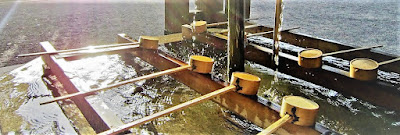We take this essential source of life for granted. We turn
on the tap and expect clean, wholesome water to appear, without a thought of
how it might have to get to us –
or how it's taken away! We are lucky; 10% of the planet's population don't have
clean water close to home and 25% of people on the planet don't have a decent
toilet of their own.
Water companies across the UK take 15.315 billion litres a
day to produce drinking water. The local water utility company, Severn Trent,
supply 75 million litres of water every hour which is the equivalent of 720
Olympic-sized swimming pools (1.8 billion litres) a day.
In the UK, the average person has a daily usage of 170
litres of water. Average household water use increased by around 20% during the
first lockdown; the soaring demand for water compounded by the driest May on
record put a massive strain on the water infrastructure across the country.
During these periods, water companies have urged people to save water. And why
not? According to Waterwise, if each person spent one minute less
in the shower, the UK would save 600 million litres of water every day.
One criticism from the public is that "water is free
from the sky". Technically this is correct, but there are two minor flaws
to this argument. Firstly, during May, there was no water coming from the sky,
free or otherwise. Secondly, most people won't consume rainwater and for good
reason: rainwater usually contains a combination of bacteria, viruses,
parasites, numerous chemicals, airborne particles and contaminates. People
expect high quality drinking water, and very strict standards apply, set to
protect public health and to ensure water quality is acceptable to customers.
This and the transfer of water is what makes it not free.
A second criticism is the amount of leakage from pipes. To
some extent this is true; over 3 billion litres, a fifth of the volume used, is
lost to leakage every day. Yes, it includes water lost from the companies’ distribution networks, but it also
includes supply pipe losses from consumers’ pipes. Severn Trent, one of twenty-four in the UK, are
maintaining an aging infrastructure with a 46,000km network of water pipes.
Combined with the 91,000km sewer network, this is enough pipework to go round
the Earth almost three-and-a-half times. Severn Trent have a target of a 15%
leakage reduction by 2025, and 50% by 2045 to meet the needs of long term water
management, and the expectations of customers.
The Government has
also been criticised for being too slow to implement policies that could
improve water efficiency such as product labelling and changes to building
regulations. Implementation of sustainable urban drainage systems (which would
help with flooding as well as water supplies) has also achieved very little,
through the government’s weak efforts.
In 'The Great British Rain Paradox', 72% of people in
Britain wrongly believe we have enough water to meet our needs but population
growth, rising consumption and the climate emergency is putting a huge strain
on our supplies. Water might be
found everywhere on Earth but less than 3% of the water is fresh, non-saline
water. Furthermore, of the existing fresh water, only 31% of it is available
for human consumption, which equates to less than 1% of the total water on the
planet.
It is thought that
climate change will change the volume of rainfall but also the pattern, with
generally wetter winters, heavier downfalls and drier summers. Nine of the ten
warmest years ever recorded in the UK have occurred since 2002, according to the
Met Office, while the two wettest winters on record occurred in 2012 and 2015.
In a report published on 9th July 2020, the Public Accounts Committee stated
England faces a water shortage within the next 20 years. According to James
Bevan, head of the Environment Agency,
in around 20 to 25 years, England will reach the “jaws of death – the point at which, unless we take action to change things, we
will not have enough water to supply our needs,”.
Water companies face a dilemma between needing to invest in
infrastructure to improve water supply and the pressure to keep water bills
affordable for consumers, particularly where consumers say they are prepared to
pay more. The UK has some of the highest quality drinking water in the world,
yet it costs virtually nothing. Two litres of tap water costs just 1/3p.
Compare that to unleaded petrol (£2.28+) bottled
water (c.£2.40) and beer in a pub (c.£12.50) for the same quantity. (It should be noted that bottled
water companies make bottles, not water and drinking bottled water is 900 times
more carbon intensive than drinking tap water.)
So, is drinking
water too cheap a commodity? A precious resource that is under stress yet costs
only 1p for six litres. I'd say so.

4 comments:
Not sure whether it’s too cheap - but certainly agree that it’s a far too undervalued commodity having lived somewhere where I learnt to never take drinking water for granted and had to ‘make my own’ every day! Great piece Kath.
Read about Liz’s experience next Tuesday - 6th August
Thankyou Kath....I know you are passionate about conserving water, and that made this read even more interesting. It makes a change to hear from someone within the industry. So often, we do only the popular perspective. Lots to think about 👍
Only hear lol
Post a Comment